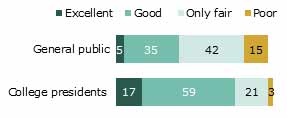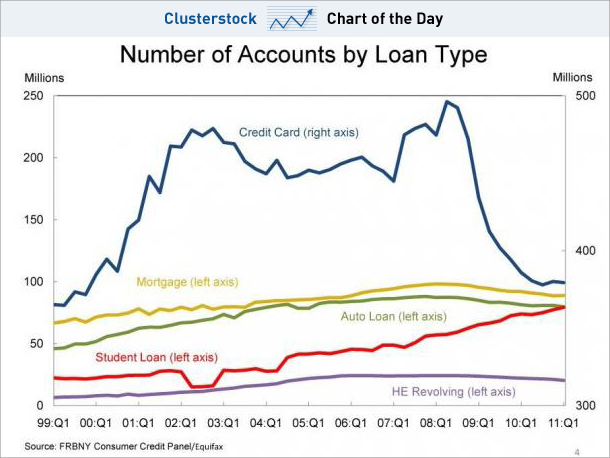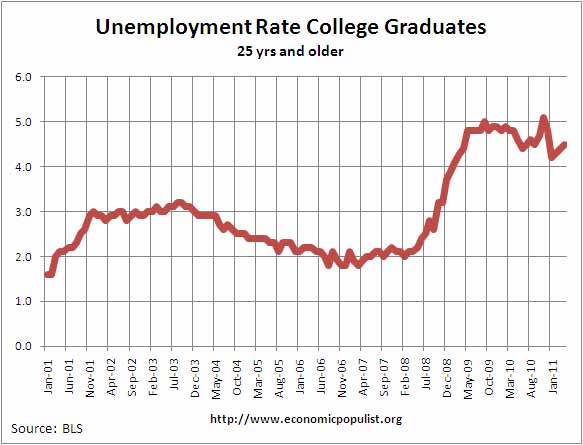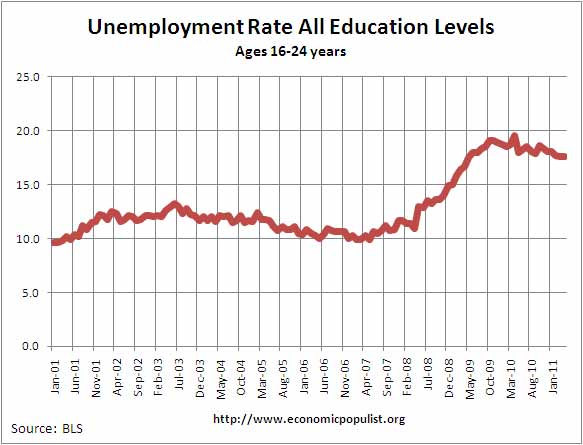
Put another nail in the American Dream Coffin. The Pew Research Center has a new study out on college. Guess what, over half of America thinks college isn't worth the money.
A majority of Americans (57%) say the higher education system in the United States fails to provide good value for the money students and their families spend, and about four-in-ten college presidents say the system is headed in the wrong direction
This year was a record for student debt, $22,900 and student indebtedness is rising faster than any other type of consumer debt.

The Class of 2011 will graduate this spring from America’s colleges and universities with a dubious distinction: the most indebted ever.
Even as the average U.S. household pares down its debts, the new degree-holders who represent the country’s best hope for future prosperity are headed in the opposite direction. With tuition rising at an annual rate of about 5% and cash-strapped parents less able to help, the mean student-debt burden at graduation will reach nearly $18,000 this year, estimates Mark Kantrowitz, publisher of student-aid websites Fastweb.com and FinAid.org. Together with loans parents take on to finance their children’s college educations — loans that the students often pay themselves – the estimate comes to about $22,900. That’s 8% more than last year and, in inflation-adjusted terms, 47% more than a decade ago.
The American Dream has put forth a fallacy. If one worked hard, played by the rules, went to college and started a career, financially one would be set for life.
To back up this claim, has been much said about the low unemployment rate for college graduates and indeed, in comparison to the general population, it is much lower. But the point of college is it's supposed to increase your lifetime earnings and keep you in a job. As we can see from the graph below, for the entire last decade, the unemployment rate for college graduates is almost three times higher.

Even worse, those now graduating from college are not able to get a job. CNN calls it the Great Recession Lost Generation and has some alarming statistics for new college graduates.
About 60% of recent graduates have not been able to find a full-time job in their chosen profession, according to job placement firm Adecco.
Bear in mind, Adecco is a notorious body shop, looking at people, including professionals, as temporary throw away disposables, specializing in providing cheap temporary labor, on a global scale.
Adecco also found that 18% of recent grads have been forced to turn to full-time jobs outside their field of study, often jobs for which a college degree is not required.
Below is the unemployment rate for those aged 16-24. These jobs are the first jobs, the ones which bootstrap young people into high skills and careers and those opportunities are disappearing. The unemployment rate from January 2001 until now has almost doubled, it's 1.8 times higher. While this is an outrage, notice the unemployment rate increase for college graduates by ratios is much higher than even the unemployment rate for the young over the past decade.

Yet it's not just the Great Recession that is causing career instability, lost income, inability to get a job in one's field. In fact this trend has been going on for a decade now as seen in the above unemployment rate graphs.
Perhaps the never ending globalization labor arbitrage agenda, the middle class squeeze and putting the U.S. workforce last, at all skill and education levels, is the real cause for why higher education is being considered not worth the payout. Not everything is the result of the recent recession.

Comments
Jobs Exported
The bottom line is simple to understand. It doesn't take an MIT graduate, nor does it take a Philadelphia lawyer to grasp the situation and circumstances. Education doesn't do one any good "IF" there are NO JOBS. We've been exporting jobs away from our economy for over a half century now. The damage has been caused by unfair, unjust, one-sided foreign trade agreements and policies, job out-sourcing, illegal immigration, corporate greed, political corruption, and the selling of America.
Because you can do wrong, and get away with it, doesn't make it right
Exactly Right
The greed is apparently unlimited
Thanks for this commentaryy
Is there value to education? Absolutely, no matter what career comes out of it. But is there value for the dollar. It's hard to sell that when tuition is so high.
I'd say this group has the problem outlined well.
Michael Collins
I think it's more than that
in supposedly college educated professional meant you probably could have a stable career and today that just is not true.
It's like triple whammy, one is the never ending pushing of the costs onto people and the second is no career to pay off those costs and the third is corporations treating professionals now like they used to treat blue collar in the 80's.
I think most of this started in the 80's, layoffs, labor arbitrage, as well.
It's all that
What I like is that the 20 somethings are getting out there and agitating. College students and graduates in the 18-24 age group may face less unemployment than others in their cohort but they are part of that group and the figures you presented are devastating. Egypt and Tunesia come to America.
Michael Collins
No Skills = No Jobs
As with all economic and other social phenomena, there is more than one variable affecting the result.
Jobs for college graduates is not only determined by overall job market, it is also a function of the relevance and quality of the education. I can't remember where I read it, but just yesterday there was a Pew Report on the low quality of college education standards relative to the past.
Also, I have read reports about the relevance issue. In short, no matter the degree, if you do not have job SKILLS, then you won't find work.
In part, the so called lost generation is the result of too many students spending too much time in school playing video games.
Has the older generation fail to instill the virtue of "work ethic" in the youth?
No jobs=No Jobs
We've been sold the line that there are all these new job openings that go wanting because there is a skills gap. Take a look at this unheralded information
Structural Unemployment and "Skills gap" - RIP
The BLS revised it's data on job openings, the author that I reference did a decent analysis of what that means and the outcome is tthat we really don't have all those new jobs. Quite the contrary, there's about zero new job growth (after all the jobs lost).
I came upon this study of thte BLS revision serendipitously. I figured I had not news. Nah, it hasn't made a splash in the corporate media. Shame because it's the truth.
Michael Collins
Aren't Colleges to Blame, Too?
College costs have been going up like medical costs for years -- way above the rate of inflation.
Yet no one ever seems to look into costs and how they could be controlled.
On the one hand, we know that the use of part time instructors has gone way up, tenured and tenure track fulltime teaching jobs are way down. Yet even small colleges seem to be constantly building new buildings? Why? They don't seem to knock down many old ones, just add and add. So where is all the money going? Have the colleges ever considered that the students might like fewer amenities and lower bills?
The colleges themselves don't seem worried that one day they'll reach a limit on what people can and will pay. Are there really enough people out there to keep all the private ones open if costs go up 5% annually while most Americans' income is staying the same or dropping?
Cost Ratio
The cost of everything goes up. I can remember going to the store and buying five loaves of bread for a dollar. I can remember seventeen cents a gallon gasoline. I can remember rural undeveloped land selling for fifty dollars an acre back in 1971 in Alabama.
The problem is the real cost of living to real wages ratio. While cost has increased, wages have lagged way behind. Each year, the gap between the actual cost of living and wages widen. Yes, the cost of higher education continues to go up. And, yes, at some point the cost will be unaffordable for most of our population. We can also include the cost of proper medical care in that scenario.
The problem becomes an economic "tug-of-war". One side pulls towards affordability, and the other side pulls towards "inflationary greed". Again, we can reference the "run-away" cost of higher education to the "run-away" cost of proper health care. Both are basically pricing the majority of citizens out of the market.
The loss of the Middle Class has a lot to do with unaffordable higher education. Many families have placed higher education for their kids down the priority list. It's a real struggle for parents to earn enough to pay for the necessities such as mortgages, food, utilities, transportation cost, and health care. At the end of the day, there's little or no money left to send their kids to college. We're living in a time where "the rich get richer, and the poor get poorer" has become a truism and realization.
Another problem seems to be one of "specialized courses of study". It's no long good enough to have just a four year degree. The constant changing demands in the job market often eliminate those with what I'll call "a general diploma". Many college students graduate without a degree that fits the workforce demands. This leaves them with college related debt, and no jobs to repay the student loans.
Of course, the main problem is the lack of jobs period. We've lost our manufacturing and industrial base, which in the past, has provided across the board demand for almost all education and skill levels. The high paying jobs are a thing of the past, and there's not enough demand to satisfy the needs of our many college grads. Thus the reason we hear about college grads flip'in burgers at fast food joints.
The present day wage scales are far behind product and services affordability. The cost of higher education will continue to rise until colleges price themselves into a market reserved for the wealthy only. Remember, greed knows no boundaries. This is true not only concerning higher education, but in many other areas including health care.
Because you can do wrong, and get away with it, doesn't make it right
global wage arbritage
Did you hear some of the things Obama said the other day to that graduating class of persons there in Memphis? He told them they need to build the skills to compete with workers in mumbai & beijing. So if those workers are willing to work for minimum wage, american workers have to compete to work for that much. How can somebody compete against workers in a foreign country? It's nearly impossible. Employers will always find someone willing to accept less pay and less benefits than an american. Even you accept less, they can go out and bid the wage down to pennies an hour. And then he smiled.
Can't believe that they get away with this crap
Clinton recently harped about the job "skills gap." That's not accurate. I did a little research and he was saying the same thing in 1999. Now Obama want's us to compete with minimum wages in developing nations. What a solution that is! They're both just shilling for the labor arbitrage scam. Shameless leaders are a shame for the country.
Michael Collins
Skills Gap?
How about a "political will" gap? There is plenty of work that needs to be done in this country -- Senator Obama said so when he was running for what turned out to be "Shill-in-Chief." The problem turns out to be that the responsible party for infrastructure is -- you guessed it -- the government. And the Money Party is unwilling to pay taxes (most of their leaders, it turns out, were also unwilling to serve in uniform -- pardon the cheap shot, but war has again become fashionable). It's that libertarian thing, I guess.
The country needs infrastructure and it has to raise the money for it. If tax cuts mean more debt, then we can't afford tax cuts. If our multinational corporations depended on governments to protect them, it's unpatriotic not to pay taxes. The jobs are here, waiting to be done -- it's just that the Corporatists aren't willing to pay for them. Too bad we can't bring over some of those low-wage Chinese workers like we did in the 19th century.
Frank T.
Too many people and not enough jobs
The problem is simple: There are too many people and not enough jobs.
To fix it we need to work on one or both sides of the equation:
1) reduce the rate of population growth
2) increase job growth to at least population growth
More college degrees aren't going to help here.
In 1970 the population of the U.S. was 200 million. We are now up to 311 million and increasing at a rate of one person every 14 seconds! According to the US Census Bureau:
TOTAL POPULATION: 311,377,420
COMPONENT SETTINGS FOR MAY 2011
One birth every.................................. 8 seconds
One death every.................................. 12 seconds
One international migrant (net) every............ 45 seconds
Net gain of one person every..................... 14 seconds
The U.S. economy is very sick. It can't add any jobs, much less add enough jobs each month just to keep up with workforce growth.
Population vs Opportunity
Yes, we do have a rapidly growing population. Yes, we do need living wage opportunities that cover all education and skill levels. But, a rapidly growing population creates a rapidly growing demand for goods and services. The problem is that we no longer produce what America uses and consumes. Our rapidly growing population is dependent on foreign imports. We import what we use and consume. Meanwhile, our workforce stands in long unemployment lines, and survivies off of unemployment checks and government assistance programs.
We've closed many of our plants and factories in favor of cheap foreign imports. Our living standards do not allow us to compete with third world wages. We've become a "user nation", and no longer a "producting nation". We are supporting foreign economies at the expense of our own.
We import electronics, furniture, tools, toys, farm equipment, hardware, housewares, appliances, textiles, food, lumber and building materials, autos, sporting goods, etc., etc., etc.
In addition, we out-source jobs to cheap foreign labor markets. Microsoft and others out-source jobs to India, Southeast asia, and other Pacific nations. Banks out-source jobs, as does some businesses in the legal and medical professions. We have an illegal immigration issue, and an issue with H-1B visas. We have businesses that relocate outside of our borders in order to take advantage of less restrictions and cheap labor.
A growing population produces a growing demand for goods and services. The problem is that we allow other countries to provide the goods and services, and to satisfy the demand.
Our problem is not one of population growth, it's one of not providing adequate living wage opportunities to satisfy the growing demand. Our main problems are unfair, unjust, and one-sided foreign trade agreements and policies, job out-sourcing, illegal immigration, H-1B visas, and businesses that relocate outside of our borders unpenalized.
The bottom line is that we've been sold out by the very ones that we've entrusted our well-being to. "Global Economy" means equalization to the lowest level. We're unemployed because we haven't yet equalized to the bottom.
A college education would be worth a lot "IF" we were not supporting foreign economies at the expense of our own. But, you're right, at this stage of the game, a college education has been neutralized by the "selling of America". And, guess who sold us out.
Because you can do wrong, and get away with it, doesn't make it right
population
Population does affect wages, labor markets and that's what it is the "base of all numbers" for the employment reports. Labor comes from population.
This is a reason why both India and China are trying to capture services and manufacturing, respectively. They have way too many people and this is their solution to employ them.
But believe this or not, in China, they have captured so much of the globe's manufacturing they have a labor shortage. A labor shortage with 1.4 billion people in that country.
So, it's not only population that buys goods and services, it is the type of population. If one imports the globe's unskilled labor, poor, that lowers wages for the people in that skills class already here and without wages to generate disposable income, if the government is supplementing that labor through social services, Medicare, food stamps and so on....it's a huge drag on an economy.
That said, if one is displacing workers, even at the highest skills level, that too will repress wages, reduce disposable income and that also is a drag on the overall economy.
On the other hand, if one is not displacing, flooding a saturated labor market with more labor, and there is no direct worker substitution, increased labor supply, can benefit the overall economy, but this requires overall strong economic growth/activity or new sector activity and it requires no worker substitution.
Unfortunately loads of economists due to some absurd philosophy, like to "game" the equations to spit out fiction because this topic is politically front loaded.
But bottom line, in the U.S. we have loads, tons, maximum, evidence U.S. workers are being subject to displacement, labor arbitrage and wage repression due to the flooding of the U.S. labor market.
All, watch out for some serious economic fiction in these categories for there are forces at play from inane "globalization is good because I say so" economics to the U.S. Chamber of Commerce putting out white paper spin fiction due to their overall global labor arbitrage agenda, to ethnically based special interest groups who spew nonsense for their own political and philosophical agendas to some very powerful foreign business interests, such as the Indian BPO industry (who Bill Gates is a member of folks!).
A Lack Of Opportunity
You're correct, I totally agree. Yes, population does effect, and affect, the labor market. What we have is a labor pool without opportunities to work. Our labor cost too much, and we're accustom to cheap imports on the store shelves. It all goes back to our import dependency. America no longer produces what America uses and consumes. This puts our labor force in the unemployment lines.
Population generates demand. A growing population generates even more demand. Someone has to provide the food, clothing, shelter, health care, infrastructure, transporation, housewares, appliances, energy, farm equipment, tools, replacement parts, services, and many other needs. Where do we get the majority of what we use and consume? Certainly no one believes that our workforce enjoys being unemployed. Our work force would and could provide our needs.
A growing population means a growing demand for goods and services. A self-supporting economy means that the general population provides for itself. A healthy economy means that there's an adequate positive cash flow, generated by the population buying and producing goods and services.
At present, we have a negative cash flow. Our negative cash flow is caused by our dollars purchasing foreign made goods, instead of Americans producing and buying American made goods. Thus trade deficits as just one example. As our dependency grows, the number of living wage jobs decline.
We are a nation of buyers, but we're not a nation of producers.
Americans no longer have the opportunity to be self-supporting. Our government has made sure of that.
Because you can do wrong, and get away with it, doesn't make it right
1 million people ... but only 62,000 jobs
1,000,000 people apply for 62,000 jobs at McDonalds! Over 900,000 people who wanted to work ... even for low wages in the service sector, were turned down.
One Million Apply for 62,000 Jobs…with McDonald’s
I'd say that's TOO MANY PEOPLE AND NOT ENOUGH JOBS.
Really sad. Almost one million people turned away that want to work because THERE ARE NOT ENOUGH JOBS.
It's a travesty that Obama and Congress are doing nothing to help this situation.
Pledge of Allegiance
Allegiance
Loyalty or the obligation of loyalty, as to a nation, sovereign, or cause. The obligations of a vassal to a lord.
trea·son
NOUN:
Violation of allegiance toward one's country or sovereign, especially the betrayal of one's country by waging war against it or by consciously and purposely acting to aid its enemies.
A betrayal of trust or confidence.
Do these terms seem to identify a governing body collectively known as the US Congress, which has acted with little if any allegiance to the people which it represents and for which its actions, through legislation enabling the enemies of said represented, causing the transfer of said representeds wealth has compromised the health safety and general welfare of said represented, the entire body inclusive of the executive branch should be prosecuted for acts of TREASON.
enough is enough
any legislation providing tax incentives for offshoring of American Jobs or industry should hereby be deemed unconstitutional and revoked. Any Representative that voted to pass such legislation should be held for treason against the United States and prosecuted to the full extent of the law. Any executive that signed such legislation into law should also be justly prosecuted for acts of treason.